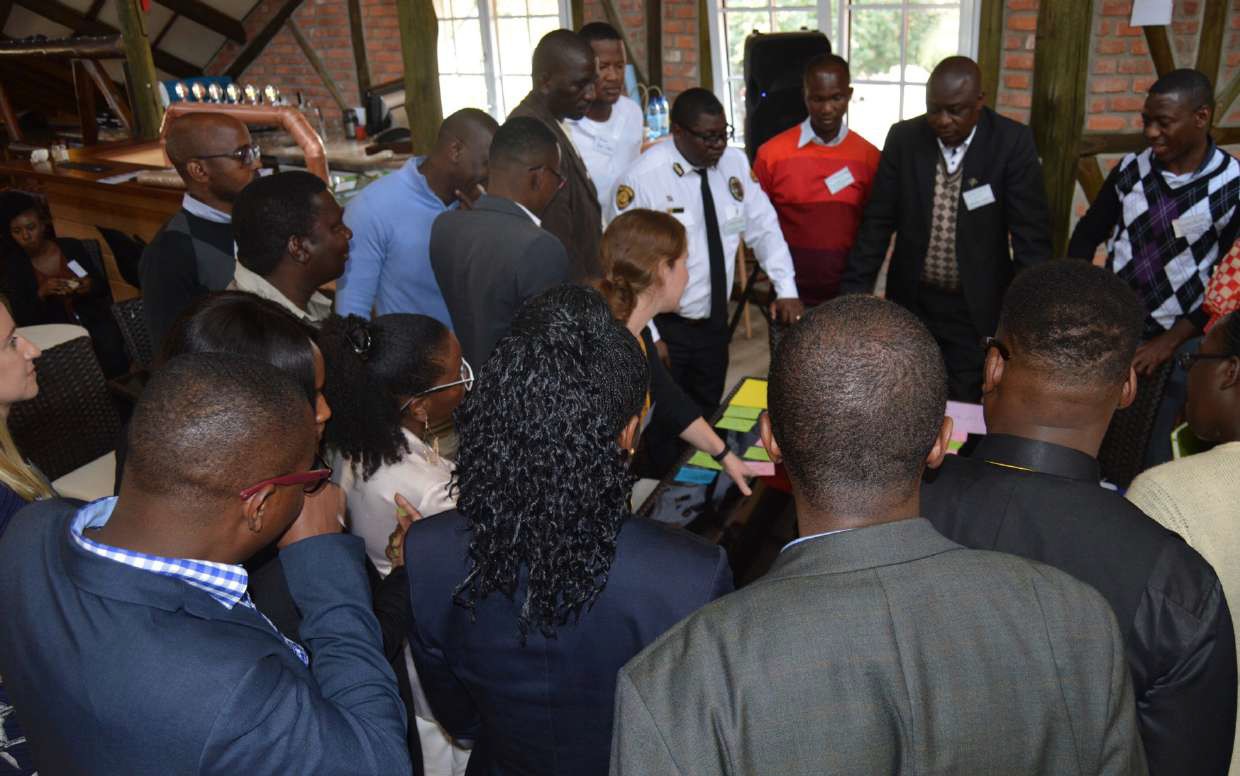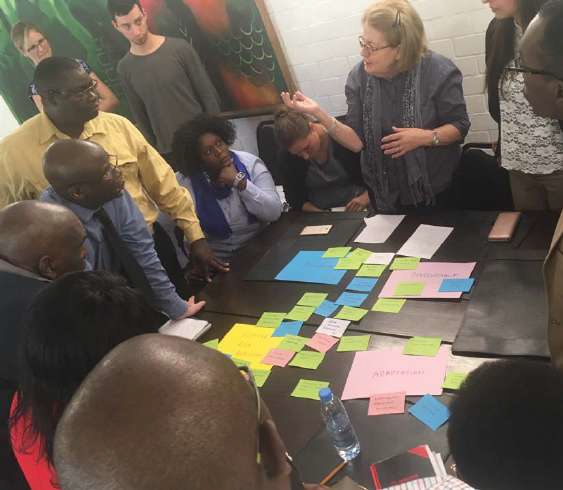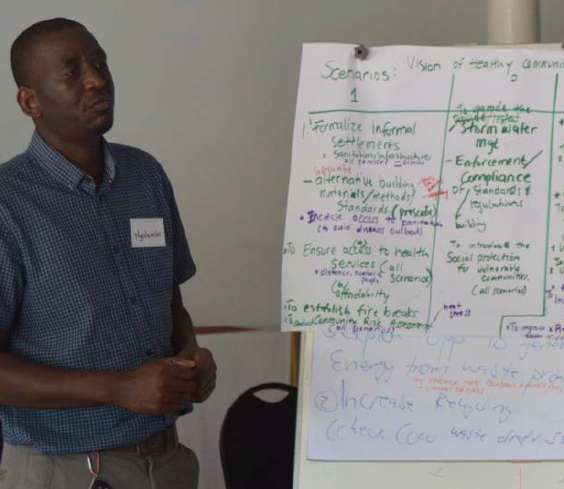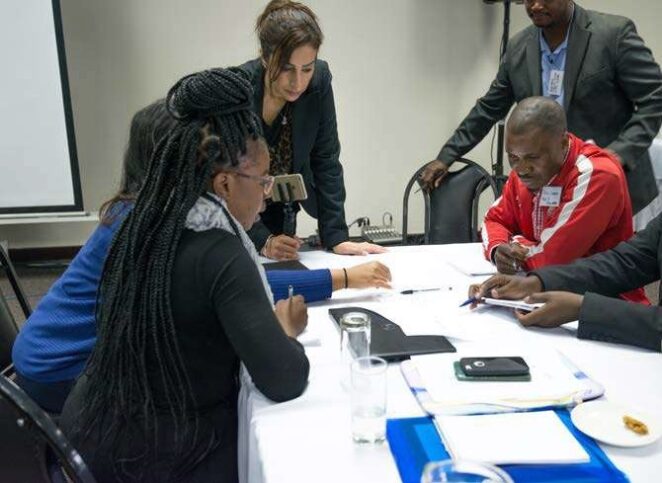“Explainer” Guide: Co-exploring Terminologies

Introduction
Terminology can be a barrier to understanding climate change, and to taking action. People who have limited interdisciplinary experience can easily misunderstand a number of terms, such as weather, climate, adaptation, mitigation, sustainable development, and disaster risk reduction.
A “level playing field” of knowledge about basic climate-related terminology among all participants sets the stage for more in-depth co-exploration and co-production (“transdisciplinary knowledge integration”) to support adaptation decision-making.
This brief:
- Explains why co-exploring language and terminology is important for creating a level playing field at the beginning of a multi-stakeholder engagement.
- Outlines how to use a simple exercise to co-explore climate-related language in a workshop.
- Provides an overview of situations in which this activity can prove helpful.
- Offers a case study from Windhoek, Namibia, that shows what the activity can achieve.
For information on how to facilitate this activity, refer to the companion “How-to” Guide. Differential use of climate change terminology was particularly noted within the City of Cape Town as an impediment to moving forward with multidisciplinary climate change decisions within the City. Read this article to explore how they identified terminology discrepancies and came to a common meaning of terms.
*Download the full publication from the right-hand column. An outline of the explainer is provided below. See the full text for more details.
The Activity
This co-exploration exercise introduces climate, adaptation, disaster risk reduction and development concepts to workshop participants.
Participants discuss concepts with one another to identify key differences: 1) between weather and climate, and 2) between development, adaptation, mitigation, and disaster risk reduction. Participants receive a series of written statements/actions (such as, “Today it is raining”). They must then cooperatively decide to which concept the statement/action belongs.
The facilitator then explains the meaning of the different concepts and statements/actions. Using this new information, participants then rearrange the statements/actions linked to each concept accordingly, and discuss what they have learned.

The Benefits
- The activity breaks the ice at the start of a workshop, giving participants who may not know one another a chance to interact.
- A game offers a non-threatening way to give participants the opportunity to share thoughts, and to address potential sources of confusion or misunderstanding.
- The activity encourages conversation about key issues and sets the stage for deeper discussions.

This activity is useful when…
- You believe that climate science and climate-related terms are misused and/or misunderstood in a given context.
- You are beginning a workshop or engagement, or you want to provide an introductory exercise for other climate-related activities.
- You believe that the participants have different types and levels of knowledge.
- You want to open up dialogue among a group.
- You want to improve the ability of decision-makers and other stakeholders to articulate climate information needs.
This activity can…
- Raise awareness about climate change.
- Clarify meanings of climate-related terms that are often misunderstood and misused.
- Unpack the meaning of “climate information”.
- Increase receptivity to climate science and information and opportunities for its use.
- Create a “level playing field” of knowledge of basic terminology among all participants.
- Establish a foundation for further co-exploration.
- Break the ice among participants who don’t know one another.
- Provide peer-to-peer sharing and learning in a safe space.
- Give all participants opportunities to contribute.
- Raise awareness of the co-benefits from mitigation, adaptation, sustainable development, and disaster risk reduction.
Windhoek Case Study
A direct request from Windhoek city stakeholders seeking to co-develop the city’s first Climate Change Strategy and Action Plan led to the development of this activity to address misunderstanding about climate-related terms that had previously surfaced.
Discussions led to greater awareness of:
- Changing rainfall patterns, and effects on farming practices.
- The potential misunderstanding that can arise from different meanings attached to the same concept.
- The reasons for uncertainties about future climate projections. Projections from different climate models produce different results.
- The need for a change of mindset, away from working in silos towards a transdisciplinary approach.
- The co-benefits of some strategies and actions.

This guide written by Elizabeth Daniels and Sukaina Bharwani from the Stockholm Environment Institute, in Oxford.
We are grateful to FRACTAL colleagues and partners for their input to this activity, namely Kornelia Iipinge (University of Namibia (UNAM) /City of Windhoek (CoW)), Olavi Makuti (CoW), Saima Haukelo (CoW) and Dr John Mfune (UNAM). The authors also thank FRACTAL colleagues and partners who supported in delivering this activity in multiple cities. Photo credits: Kornelia Iipinge (UNAM/CoW), Elizabeth Daniels (SEI), Sukaina Bharwani (SEI).
Suggested citation
Daniels, E., and Bharwani, S. (2020) Explainer: Co-exploring Terminologies. Transdisciplinary knowledge integration series Explainer #1. Stockholm Environment Institute, Oxford
Related Articles
Related resources
- FRACTAL: Future Resilience for African Cities and Lands
- Dialogue for decision-making: unpacking the ‘City Learning Lab’ approach
- Embracing the uncomfortable silences in climate information exchange
- Receptivity and judgement: expanding ways of knowing the climate to strengthen the resilience of cities
- Ensuring Future Water Security through Direct Potable Reuse in Windhoek, Namibia
- Inspiring Climate Action in African Cities
- Drought and its interactions in East Africa
- Bottom-Up Innovation for Adaptation Financing – New Approaches for Financing Adaptation Challenges
- Climate Change at the City Scale
- “How-to” Guide: Co-exploring Terminologies
- Towards developing a common language for climate change in the City of Cape Town
(0) Comments
There is no content